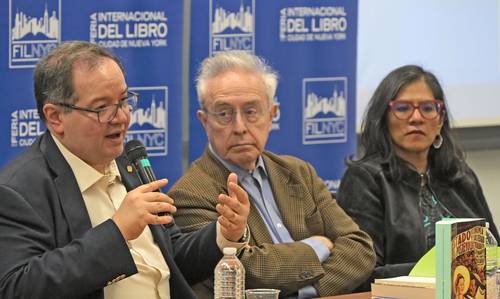▲ Rector Leonardo Lomelí (left) and Héctor Vasconcelos, permanent representative of Mexico to the UN, during the presentation of State, economy and society in post-revolutionary Mexico.Photo taken from the Gaceta UNAM site
Ny and Washington., This weekend the sixth annual edition of the New York City International Book Fair concluded with the presentation of a title by Leonardo Lomelí Vanegas, rector of the National Autonomous University of Mexico (UNAM), and a forum on literary activism, among other activities, with the purpose of promoting Latin literature in the United States.
Dr. Lomelí – accompanied by Ambassador Héctor Vasconcelos, permanent representative of Mexico to the United Nations (UN) – presented State, economy and society in post-revolutionary Mexico.
He explained that the book, with contributions from experts, focuses on the period from 1917, with the first post-revolutionary government, until the oil expropriation, in 1938, in which the modern State was established in all its dimensions, from education , with the creation of the secretariat of the branch, the agrarian reforms and the financial system – including the creation of the Bank of Mexico –, until the new flowering of culture and international relations.
He indicated that this first post-revolutionary stage revolved around an essential conflict of a State that, starting in 1917, It required new agreements (with businessmen) to reactivate the country’s growth, but it had to defend the social achievements, which, more on a programmatic than a real scale, were in the Constitution, although progress would gradually be made in them.
. It was a time in which a revolution was being institutionalized, a country was rebuilt and the past was revalued
he stressed.
Renaissance with challenges
When asked about a comparison with the present, Lomelí commented: There is a renaissance in many areas, but we also have the great challenge, a bit like in the post-revolution years, of recovering control of our territory from organized crime.
.
He indicated that Mexico could today be on the verge of a new cultural movement
that UNAM wishes to support.
Lomelí Vanegas emphasized that part of the purpose of her book, as well as its presentation at the fair, is to spread knowledge about Mexico abroad. that they know us more so that they understand us better
.
Ambassador Vasconcelos pointed out that there are contemporary parallels in the volume, since “everything indicates that there will be very important changes in Mexican society, both in institutions and in practices; the way we relate politically, socially… and, of course, we encounter the same old resistance”; Then, he evoked Independence, the Reform, the Revolution, and added: I think something similar happens in Mexico today.
. For this reason, he welcomed this book that today can offer context and clues, he noted.
As part of the extensive program of activities, the fair offered a forum on literary activism, moderated by Cinthya Santos Briones, where experiences were exchanged around the creation of collective literary projects. In addition, recipe books accompanied by paintings and photos that offer a vision of cultural expression, especially the culinary community project of the La Morada restaurant in the Bronx, headed by Mixtec chef, Natalia Méndez.
The cook explained that this food culture is part of the heritage of our ancestors
which he learned at the age of six and which he now shares with New Yorkers.
He explained that all food is earth and fire. The earth tells us how to cultivate it
while, when the food arrives in a kitchen, the fire takes control
. He added that “the fire talks to you… the kitchen is a delirium, the beans talk to you; “Everyone talks to you.”
Others addressed the importance of publishing and disseminating translations of poems in Nahuatl, Spanish and English in this city, to rescue everything we left behind
when migrating.
Irma Uribe told about the Ate con Queso publishing project, for children’s literature, which has managed to give books to more than 130 thousand families.
Migration: changing focus
In a forum on democracy and literature, the writer Benito Taibo commented that savage capitalism depoliticizes democracy
addressing the threat of Donald Trump’s fascist project.
I’m scared of what I see and hear
he stated. In contrast, he expressed: I have great hope
in the new government of Claudia Sheinbaum, in part because of her career, which has always been leftist
.
In a dialogue on migration, some journalists addressed the need to change the narrative about this phenomenon.
National Public Radio correspondent Jasmine Garsd urged overcoming the misery porn
which is displayed when reporting on people in transit. For Jesús García, The Opinion, the narrative has to make a turn when addressing these issues, as part of a solution, not a problem
for the United States, by pointing out its immense economic, social and cultural contribution.
The New York City International Book Fair is an initiative of the Institute of Mexican Studies of the City University of New York with the participation of writers, journalists, translators, playwrights, poets and academics from the United States and more than one dozens of Spanish-speaking countries.
